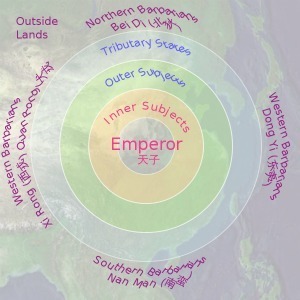America is muddling through middling relationship with the Middle Kingdom

By Peter Bacon
Best Defense Academy of Frenemy-American Relations
At SAIS the other day, the Kettering Foundation and the
Institute for American Studies at the Chinese Academy of Social Sciences (CASS)
held a high-powered conference on the future of U.S.-China relations, featuring
pretty much all the big names in the China racket. If you weren't selected to
be one of the illuminati, here is what you missed:
--Professor David Lampton of SAIS summed up the conference's
assessment of Sino-American relationship as "not in the best of times, but not
in the worst of times." Both Professor Lampton and Rear Admiral Eric McVadon
both identified believe that the relationship has evolved over the past decades
from a one-dimensional, anti-Soviet Cold War partnership to a "three-legged
stool," of security, economic, and culture relations. Elites within both
countries bolstered this relationship: Tao Wenzhao, a senior fellow at CASS,
argued that the recent meetings between elites such as Hu Jintao and President
Obama, and between Joe Biden and Hu's putative successor Xi Jinping augured
well for future
Sino-American relations. Indeed, Wenzhao remarked that one Chinese official
observed that "Mr. Jinping [had] never spent so much time with a foreign guest"
as he did with Biden. The conference's keynote speaker, former National
Security Advisor Zbigniew Brzezinski, similarly identified the Hu-Obama
communiqué issued during the two leaders' meeting as "a real blueprint of
strategic objectives shared and 34 tangible paragraphs elaborating on them and
tasks ahead for the relationship."
--The panelists overall still felt quite uneasy about the
future of the Sino-American relationship. Stephen Orlins, President of the
National Committee on U.S.-China Relations, memorably remarked on his experience
on Chinese television when he was asked by a Chinese audience member "why every
U.S. policy was designed to oppose China's rise." Tellingly, Orlins continued,
"everyone in the audience [stood] up and [started] to applaud." Brzezinski,
similarly, wondered whether the anti-China rhetoric from the field of
Republican candidates could engender "a more Manichean vision of the world"
within the American government. Panelists on public perceptions of the United
States and China confirmed this: Yuan Zheng, a Senior Fellow from CASS, found
in studies from 2008 to 2010 that "ordinary Chinese have mixed feelings towards
the US, just as [ordinary Americans] with China." Indeed, he continued, "56 percent of
those Chinese surveyed felt that American policy was two-sided, geared towards 'cooperation
and containment.'" Andrew Kohut, President of the Pew Research Center, also
pointed out that 58 percent of Americans felt that the United States needed to get
tougher with China on trade, while 56 percent of Americans simultaneously felt that
the United States and China needed to build better relations.
--Panelists and speakers at the conference argued that these
ambivalent tensions necessitated a global condominium between America and
China, or, in the words of Brzezinski, "to act towards each other as though we
were part of a G-2 without proclaiming ourselves to be a G-2." This "basic generalization"
of Brzezinski followed on statements made by other speakers such as David
Lampton and Tom Fingar of Stanford University who both argued that without
Sino-American cooperation and leadership, problems of international economic
management, collective security, or climate change would not be dealt with.
Fingar further argued that each power needed to pursue this cooperative
partnership even if we had not reached a state of mutual trust between the two
powers. The "very real, very now" nature of issues such as climate change and
its impact on national security and ever-changing threats to global security
necessitated a partnership even as publics and elites remained distrustful of
each other.
Thomas E. Ricks's Blog
- Thomas E. Ricks's profile
- 436 followers



